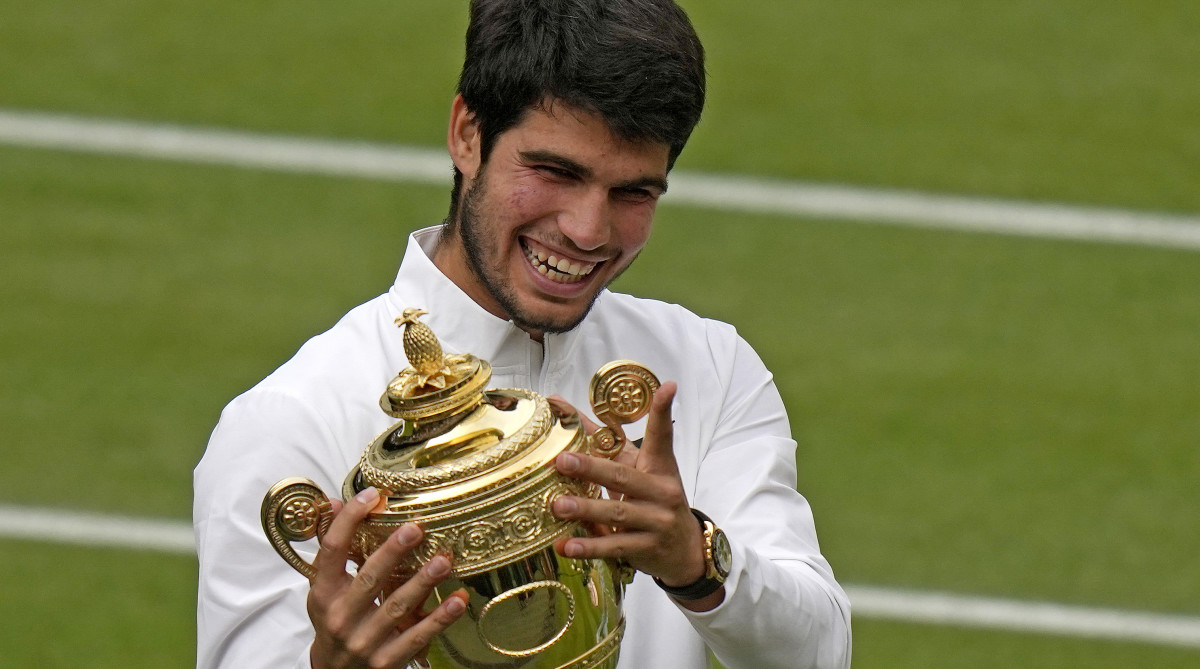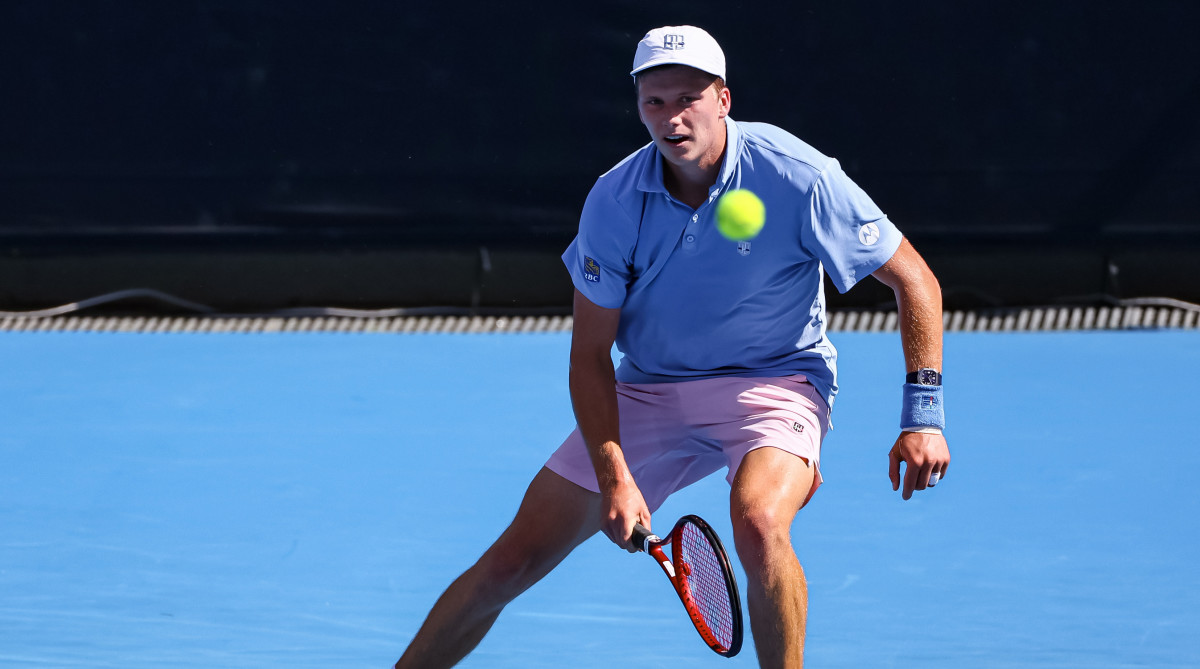Tennis Is Profiting Off Sports Betting. Its Players Should, Too.

Hey, everyone ...
• I spoke with Gill Gross about some of the macro issues in tennis: the Saudi dilemma, the WTA’s perilous finances, doping, on-court coaching, etc.
• Who wants to direct tennis at one of the most august clubs in the U.S.?
• An extended round of applause—and Montgomery Inn gift card—for tennis treasure Greg Sharko.
Onward ...

We had a lot of chatter over email and Twitter last week about tennis and its relationship with sports gambling. This was triggered by the news that Mark Philippoussis was fined for breaching betting rules. Philippoussis ought to know that, despite unfortunate headline, his reputation remains intact. And moreover that the optics here for tennis are really lousy. You wanted a rant? We are here to please:
Sports betting traces a familiar arc. Society rejects a product/practice on its face and states the case why it ought to be prohibited. The behavior persists—be it in basement speakeasies, or in dorm rooms with towels placed in jambs or through bookies. The mainstream sees the lost revenue and decides that, ya know, maybe this activity isn’t so bad after all. And, hey, if it’s legalized at least we can regulate it, tax it and professionalize it, and, of course, monetize it. Sometimes this works, and we move in from the margins. (I’m not sure there are many ardent supporters of Prohibition left.) Sometimes the shift is less defensible.
Barely a decade ago, commissioners of major U.S. sports testified before Congress that overturning the Professional and Amateur Sports Protection Act (PASPA), the 1992 act effectively banning sports wagering outside of Nevada, would undermine the integrity of their sport, bring in disreputable characters, lead to tanking and fixing and point-shaving. Then these executives realized the vast revenues were being wagered underground, and said, “If you can’t beat ’em, join ’em.” So it is we have sportsbooks inside arenas and “data partnerships” and a Super Bowl hosted in Las Vegas.
Tennis, like all sports, had a choice to make. Did it want to suckle at the teat of sports gambling? It did. The ITF signed what is euphemistically called “a data rights deal.” So did the tours. Tournaments signed their own betting sponsors. Former players became brand ambassadors (another euphemism) for gaming companies. And the sports media—ESPN and Tennis Channel and Sports Illustrated—happily took sponsor dollars as well.
The players? As is often the case in tennis, they had no real seat at the table. They are not only prohibited from this revenue stream, unable even to make a patch deal with a betting company; they are fined for any affiliation on integrity grounds.
So a player on the ATP Tour (Sportradar) could play in the Miami Open (Betway) and be greeted by tournament director James Blake (Rush Street Interactive), and their match could air on Tennis Channel or ESPN (DraftKings) … and if the player used the products that everyone is monetizing, the ITF (Sportradar) would fine him. Got it.
Devil’s advocacy: You cannot have players betting. There’s just too much potential for manipulation and fraud and corruption. I would respond that tournaments determining match times and scheduling, and tours that employ trainers who have insider information about injuries and stat keepers making subjective decisions, are just as susceptible. If the proverbial toothpaste is out of the tube and tennis—like most sports—has become dependent on the sports gambling revenue, so be it. We can argue the ethics. But here’s what shouldn’t be up for debate: Either all stakeholders benefit, or none do. Taking this loot while players are foreclosed is simply wrong.
Jon, I know you are obsessed with rivalry. My question: Is it really possible that Djokovic and Alcaraz could be tennis’s next great rivalry?
Brandon, N.J.
• First, can I plead down “obsessed with” to “deeply interested in.” Your question is interesting. I do think rivalries are the superpower of sports. We enjoy them as fans and followers. But they also tease out the best in the participants. If the basis of sports is competitive, rivalry is the rocket booster. There is all sorts of social science showing that we compete better—run faster, run longer, hit balls more accurately, score higher on tests—when we peg our performance to someone else.
There are some basic ingredients to rivalry. Both sides must be engaged. (If Michigan State has Michigan in its crosshairs, but Michigan sets it sights on Ohio State, is there really a rivalry?) There must be wavering results. (If Serena Williams—and here we quote Adam Duritz—cut up Maria Sharapova, and beat Sharapova 20–2 is there really a rivalry?) Rivalries take a while to bake. Chrissy Evert and Martina Navratilova played 80 times. They should also represent some larger contrast or competing belief system. Lefty vs. righty. Outspoken vs. reserved. East vs. West. Whatever.
Novak Djokovic vs. Carlos Alcaraz meets most of the criteria. What concerns me—and potentially limits this—is time. Djokovic is 16 (!) years Alcaraz’s senior. This speaks well of them both. Bravo to Djokovic for holding his own against the kid. Bravo to Alcaraz for being a worthy rival of a titan with 23 majors. Bravo for tennis for accommodating them both. We have contrasts. We have a theme of youth vs. experience. We have a small sample size, but swaying results, not least in the two most recent majors. But realistically, how many more times can they play, at least when they’re close to their peaks?

Hi, Jon,
It’s been a tough year for Jenson Brooksby after the American’s quick rise into the top 40 by 2022—wrist surgery, splitting from his longtime coach and now a suspension due to missed doping tests. Any sense of when we'll next see him in action and what happens next with his suspension appeal?
Thanks, Rob
• Direct from the source (who makes his Tennis Channel debut this week):
“Regarding my return—my recovery from wrist surgeries is going great. Dr. Shin at Kerlan Jobe in LA was a blessing and my rehab has been going great in Dallas with Dr. Megan Wood’s team.
I am unable to comment on the provisional suspension as it is ongoing. I do look forward to having the opportunity soon to provide all the evidence and explain what happened. As I mentioned in my release I was at the official tournament hotel where I said I would be, and in my hotel room, and the time that I had said I would be there. I respect the protocols set in place to protect the integrity of our sport. I do love this sport and miss competing. Regards, JT”
Hi Jon,
Dispatch from ATP Tournament in Newport: a great small grass-court tournament any tennis fan would do well to attend and support. Tickets come with a free admission to the Tennis Hall of Fame museum. The scenic grounds in the center of the town are often populated by former pros and members of the HOF, such as Tracy Austin, Mary Pierce and Ivan Lendl. Tennis writer and HOF member Steven Flink was present, although seemingly more startled by being recognized than the players were. New inductees Rick Draney and Esther Vergeer were there Saturday and wonderfully engaging with fans. ( Her induction speech was an instant classic.)
The final between veteran Frenchman Adrian Mannarino and up-and-coming young American Alex Michelsen was top quality. But, I guess this was the weekend for balding men in their 30s as Long Lost Siblings Mannarino and British Open winner Brian Harman hoisted trophies.
Cheers,
Ken Wells, Newport, R.I.
• Thanks. Really appreciate that. These dispatches are a joy to read and also helpful. How fans consume events is always of interest. The Hall of Fame is a real tennis treasure—on so many levels; I could live in the library—and the event, not unlike the winner, tends to outperform. (Now hold a WTA event simultaneously.) And yes, good pull on Mannarino, the first man to win the Newport and the British Open the same weekend.*
*Quick Mannarino story: This year, the Sunday before Wimbledon, he was ahead of me getting into the grounds. For whatever reason, his badge wasn’t scanning. He was denied entry, as guards did not recognize him. They did not give much weight to the fact that he was sweaty, carrying a racket bag and sure would be doing a lot of cosplay if he was an imposter. Not once did he pull the “Do you know who I am?/Google me, pal/I am three weeks removed from winning an ATP event” card. When the guard apologized, Mannarino said words to the effect of, “We’re good. I know you are just doing your job.”
I’m an Atlanta resident who goes to the Atlanta Open every year, and it occurred to me looking at the day matches (in person and on TV) that people may be wondering why no one is in the stands. Here is some information that may shed some light ...
1. First, it is really hot in Atlanta. Not Phoenix hot, but we have humidity to go along with the heat. Combine that with a lot of sun, and it is really hot.
2. The first three rows all around the stadium are VIP seating that have access to an air-conditioned lounge with food and drink and big-screen TVs showing the stadium matches. (They also have a view of the Grandstand court from the lounge.)
3. On the north end of the stadium court is a big air-conditioned building, and the seats right in front of that building have access to the air conditioning (along with food and drink). From inside the building, they can see the courts.
4. On the south end of the stadium court are the covered suites—those folks can sit in the seats or sit at tables up by the food and drink—no a/c, but they have shade and fans.
5. The hoi polloi sitting on the two sides have seats with no a/c and no covers/shade, but there is a hospitality area on the grounds that is covered, has fans, a bar and a big-screen TV showing the stadium court matches. I was there today (Tuesday), which was high school day, and there were dozens of high school kids all over the grounds—but mostly hanging out in the covered hospitality area—and not in the stands.
5. There is also a Grandstand court and everyone who has a seat in the stadium court has access to the Grandstand Court. Sometimes the matches on Grandstand are much more exciting than the ones on Stadium. A couple of years ago on college night, there was a boring match on Stadium, and Jack Sock was playing on Grandstand. Grandstand Court was packed, and there was a line waiting to get into the seats when someone finally left.
6. Oh, and did I mention that it is really hot in Atlanta? It will get close to 100 degrees (with humidity later this week).
Thanks. Lilas Pratt
Marietta, Ga.
• Thanks. Did I mention how much I enjoy getting these dispatches?
Every year as Wimbledon approaches (and of course during the tournament itself), I basically play the old NBC theme on loop—so thank you to Jason Rainey for sending last week. I want to add to Jason’s contribution by suggesting you start the NBC theme video at the 0:28 mark exactly as the full replay of the 2023 men’s final hits the 4:02:10 mark. You can thank me later.
Ben, Minneapolis
• We’ll thank you now.
SHOTS, MISCELLANY
• Unsolicited book recommendation: Old Town Road by Chris Molanphy.
• Who wants to go to Croatia for Davis Cup?
• Western & Southern Open fans will get another chance to see seven-time major tournament champion Venus Williams as she has been awarded a wild card for the Aug. 12–20 event.
